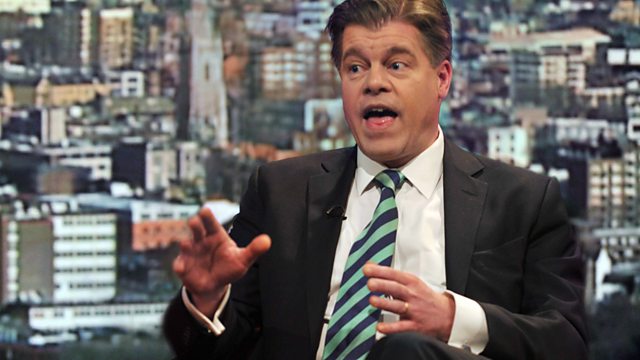Episode 1
Andrew Rawnsley chairs a live discussion with top journalists as they debate what should be said in three newspaper-style leading articles about the top stories of the moment.
Andrew Rawnsley returns with the live, studio-based debate series taking the form of newspaper leader conferences.
Contributions from listeners are also strongly encouraged throughout the programme on Twitter (#r4leader) and by e-mail (leaderconference@bbc.co.uk).
Andrew was joined by Jenni Russell of the London Evening Standard; Trevor Kavanagh of the Sun; Anushka Asthana of the Times; Jonathan Ford of the Financial Times; and Kevin Maguire of the Daily Mirror.
They debated: the UK economy; the Abu Qatada affair; and Britain's bee population.
Where Next for the British Economy?
The economy shows little sign of sustained growth. Those voices urging a change of course are growing louder, especially given the setbacks suffered recently by the Chancellor of the Exchequer. The IMF and a second ratings agency, Fitch, have, for example, clear doubts about his strategy. We share some of these reservations.
No major industrialised economy is growing strongly. But retail sales here are particularly disappointing and the Co-operative Bank has given, as one of its reasons for withdrawing from its planned acquisition of Lloyds' branches, the weak state of the economy.
We recognise that there has been a big monetary stimulus in the UK. We also understand the concerns about borrowing money now for infrastructure projects whose effects may not be felt for years. Nevertheless, the case for quicker-acting measures鈥昹ike more house-building and improving Britain's roads, bridges and railways鈥昳s compelling. June's Comprehensive Spending Review also has to take account of the poor outlook for growth or it may further erode confidence when optimism is sorely needed.
Beyond this, we want to encourage more women into work where they wish to do so. Women's unemployment is at record levels and new jobs in the private sector are going disproportionately to men. Although parents can get some help with their child care bills, these costs still eat up much of a mother's pay when she returns to work. This needs to be addressed more boldly both to help women and to boost the economy.
The Abu Qatada Merry-Go-Round
Whether the radical cleric Abu Qatada should be deported to Jordan to stand trial has taken another turn with the Home Secretary's announcement of a new legal agreement with the authorities in Amman. It seeks to satisfy judges' concerns that evidence used in court has been obtained lawfully.
We fully sympathise with the frustration felt by many that a man who faces very serious charges in Jordan has so far not been made to face them there. It is also wrong that a man who is perceived to be a threat to the UK appears to be in a legal limbo.
However, the protections which the European Convention on Human Rights provides to Abu Qatada it also offers to the rest of us. The UK rightly believes in the rule of law and for so long as it is a party to the Convention it has to accept court rulings it finds inconvenient.
We therefore oppose the suggestion, apparently made by some in government, that the UK should withdraw temporarily from the Convention鈥晅o enable Abu Qatada to be deported鈥昦nd then rejoin. This seems to us unsustainable both legally and politically. While it may mollify angry MPs, it would prompt high-level resignations from the government and could not in any event be got through Parliament. Other countries that are parties to the Convention would not accept it. At least until the next election, there is no parliamentary majority at Westminster for leaving the Convention. But it has to be accepted that Abu Qatada may even then still be in British custody.
Plan Bee
We want the tragic demise of bees reversed. The prime minister has many things to focus his attention on but, as life patron of the Oxfordshire Beekeepers' Association, he will understand that bees are not only essential to the pollination of crops and plants as well as to the well-being of the planet. The precipitous decline in their numbers is profoundly alarming.
We advocate an urgent an urgent programme of research into the causes of the fall in bee numbers. Companies study this problem, but as a number of them are involved in pesticide production - which some experts suspect is part of the explanation for the slump in bee numbers - we doubt it will produce a scientifically rigorous answer.
Our plan bee is an independent study which urgently investigates the causes of the hush in buzzing bees and proposes how to restore their hum to our lives.
Producer: Simon Coates.
Last on
More episodes
Previous
You are at the first episode
Next
Broadcast
- Wed 24 Apr 2013 20:00麻豆社 Radio 4

